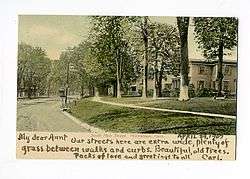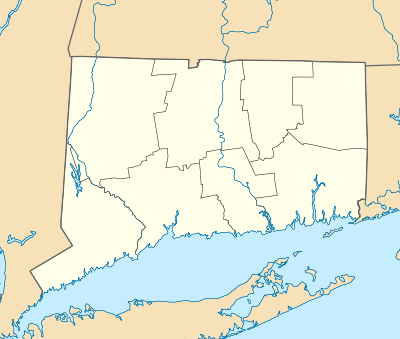Middletown South Green Historic District
Located in Middletown, Connecticut, the Middletown South Green Historic District was created to preserved the historic character of the city's South Green and the historic buildings that surround it. It is a 90-acre (36 ha) historic district that includes a concentration of predominantly residential high-quality architecture from the late 19th century. It was listed on the National Register of Historic Places in 1975.
Middletown South Green Historic District | |
 From a 1907 postcard: "Our streets here are extra wide, plenty of grass between walks and curbs. Beautiful old trees. Packs of love and greetings to all, Carl" | |
  | |
| Location | Union Park area, on S. Main, Crescent, Pleasant, and Church Sts., Middletown, Connecticut |
|---|---|
| Coordinates | 41.556°N 72.649°W |
| Area | 90 acres (36 ha) |
| Architect | Multiple |
| Architectural style | Second Empire, Italianate, and Gothic Revival |
| NRHP reference No. | 75001922[1] |
| Added to NRHP | August 12, 1975 |
Description and history
The historic district is centered on Union Park, an open green area marking the southernmost extent of Middletown's commercial business district. It includes properties set on three sides (north, south, and west) of the green, as well as properties on Crescent Street and a short stretch of South Main Street. Most of these are houses that were built in the latter third of the 19th century, although the area also includes two of the city's oldest surviving residences.[2] One property, the Caleb Fuller House at the corner of Main and Church streets, is also included in the Metro South Historic District[3]
The most common architectural styles seen in the district are the Italianate and Second Empire styles, reflective of the city's growth between the 1860s and 1880s. Both of the district's two churches, the Methodist and South Congregational, are Gothic Revival in style, although the former was built in the 1920s and the latter in the 1860s. Crescent Street includes a number of fine Queen Anne Victorians. One of the older houses, the Mather-Johnson House, is a fine example of Federal period architecture, which has been owned and occupied by two of Middletown's mayors.[2]
South Green Historic District inventory
Based on the NRHP nomination inventory except as explicitly noted:[2]
- 14 Church Street (now 14 Old Church Street[4]), Doolittle's Funeral Home, Queen Anne with hexagonal turret, 1890s, critical contributing property
- (unnumbered) Church Street (now 24 Old Church Street[5]), Methodist Parish House, Second Empire, 1880s (or 1868-1869[6]), critical contributing property
- First United Methodist Church (no address, on Church Street, now Old Church Street), 1936 (or 1930-1931[7]), critical contributing property
- (unnumbered) Church Street (now 8 Broad Street, corner of Church [8]), Synagogue (Congregation Adath Israel[8]), brick blocklike structure with low dome, non-essential contributing property
- 38 South Main Street (now 11 South Main Street[9]), 1811-1813, Federal style with Greek Revival embellishments, Mather-Douglas House (or Mather-Douglas-Santangelo House[10]), critical contributing property
- 29 South Main Street, 1880-1890, Italianate, critical contributing property
- 27 South Main Street, 1880-1890, Italianate with belvedere, contributing property
- 65 South Main Street, 1880-1890, Italianate, critical contributing property
- 63 South Main Street, 1880-1890, Italianate with wrought iron porch, critical contributing property
- 61 South Main Street, 1880-1890, Italianate, contributing property
- 40 South Main Street, 1880-1890, plain, multi-gabled rambling house, contributing property
- 36 South Main Street, 1790-1800, Michael's Beauty Salon, 3-bay, 5 course brick band, box cornice, gable roof, contributing property
- 34 & 32 South Main Street, 1880-1890, double bay projections, pediment dormers, large porch, contributing property
- 22 South Main Street,[11] D'Angelo's Funeral Home, early 1900s (1902[6]), 5-bay, gambrel roof house with Georgian symmetry, contributing property
- 33 Pleasant Street, White-Stoddard House,[12] 1870-1880 (1870[6]), Second Empire, brick, critical contributing property. Now Masonic Temple Building.[13]
- 27 Pleasant Street,[11] Hayes-Chaffe House,[12] 1870-1880 (1872-1873),[6] Second Empire, critical contributing property
- 21 Pleasant Street, Joseph Rockwell House[14] or Rockwell-Sumner House,[12] 1750, 5-bay, double overhang, Colonial Georgian, critical contributing property
- 19[15] & 17 Pleasant Street (now 15 Pleasant Street[16]), Smith-Stiles House,[17] 1870-1880 (1870-1871[6]), Second Empire, double house, critical contributing property
- (no number) Pleasant Street (or 9 Pleasant Street[18]), South Congregational Church, 1868, Gothic Revival with spire, critical contributing property
- 57[15]-83 Main Street Extension, 1870-1880, Second Empire Apartment House, critical contributing property
- 55 Crescent Street, Wilcox-Meech House,[12] 1880-1890 (1871[6]), Italianate, 3-story brick with belvedere, critical contributing property [19]
- 49 Crescent Street, George R. Finley House,[12] 1880-1890 (1872-1873[6]), Italianate with mansard roof, critical contributing property
- 43 Crescent Street, 1890-1900, 2 story, 3-bay with gable front, side bay projection, contributing property[20]
- 41 Crescent Street, 1880-1890, gingerbread, stick style Victorian, critical contributing property[21]
- 33 Crescent Street, 1890-1900, very plain Gothic, contributing property
- 31 & 29 Crescent Street, 1870-1880, large scale, Second Empire, contributing property
- 15 Crescent Street, 1870-1880 (1877[6]), Queen Anne, stick style with barge board and turret, contributing property
- 11 Crescent Street, 1900, large rambling multi-gable house, contributing property
- 4 Crescent Street, 1880-1890, Queen Anne, critical contributing property
- 8 Crescent Street, 1880-1890, Victorian stick style, critical contributing property
Gallery
 South Main St., ca. 1909
South Main St., ca. 1909 South Main & Pleasant Sts., ca. 1910
South Main & Pleasant Sts., ca. 1910 South Congregational Church ca. 1904
South Congregational Church ca. 1904- Bust of Henry Clay Work, South Green / Union Park
 South Congregational Church
South Congregational Church First United Methodist Church and parish house, on what is now Old Church Street, 2012
First United Methodist Church and parish house, on what is now Old Church Street, 2012 Mather-Douglas House, 2012
Mather-Douglas House, 2012 55 Crescent Street, 2012. The belvedere can be seen on the roof.
55 Crescent Street, 2012. The belvedere can be seen on the roof.
References
- "National Register Information System". National Register of Historic Places. National Park Service. March 13, 2009.
- Christine B. Brockmeyer (sp?) (July 1, 1975). "NRHP Inventory-Nomination: Middletown South Green Historic District". National Park Service. and Accompanying 14 photos from 1975 (see photo map on next-to-last page of text document)
- David F. Ransom (April 29, 1978). "NRHP Inventory-Nomination: Metro South Historic District / See Also:South Green National Register District". National Park Service. and Accompanying 15 photos, from 1978 (see photo map page 15 of text document)
- (Home page), Doolittle Funeral Service, Inc. Accessed 14 May 2012.
- Sources such as Churches and Places of Worship on the official cityofmiddletown.com (accessed 14 May 2012) indicates that this is now "Old Church Street". File:Middletown, CT - First United Methodist Church pano 01.jpg clearly shows that the number "24" is on the parish house, not the church itself.
- Greater Middletown Preservation Trust's Inventory of Historical and Architectural Resources, City of Middletown Department of Planning Preservation and Development, middletownplanning.com (accessed 14 May 2012), gives this date.
- While the NRHP nomination says File:Middletown, CT - First United Methodist Church pano 01.jpg clearly shows the date 1930 on the cornerstone. Greater Middletown Preservation Trust's Inventory of Historical and Architectural Resources, City of Middletown Department of Planning Preservation and Development, middletownplanning.com (accessed 14 May 2012), gives 1931.
- Contact Us, Congregation Adath Israel. Accessed 14 May 2012.
- List of sites, "Escape on the Underground Railroad", ctfreedomtrail.org. Accessed 14 May 2012.
- NRHP Inventory-Nomination, as cited above, p. 6 of PDF.
- First digit illegible in [online copy of NRHP nomination] accessed 14 May 2012, but address is also given in Greater Middletown Preservation Trust's Inventory of Historical and Architectural Resources.
- Greater Middletown Preservation Trust's Inventory of Historical and Architectural Resources, City of Middletown Department of Planning Preservation and Development, middletownplanning.com (accessed 14 May 2012), gives this name.
- Lodge Directory Sorted By Location, Connecticut Freemasons (ctfreemasons.net), accessed 14 May 2012; this also confirms the address, which is missing its first digit in the inventory. Also confirmed by photos accompanying nomination: PDF p. 19-20.
- NRHP Inventory-Nomination, as cited above, p. 2 of PDF. This also confirms the house number, which is missing its first digit in the inventory.
- Caution on citation: first digit illegible in [online copy of NRHP nomination] accessed 14 May 2012.
- photos accompanying nomination: PDF p. 18-19 shows what seems rather clearly this house at #15, so it may well have been 15 Pleasant Street even in 1975. File:Middletown, CT - 15 Pleasant St 01.jpg (2012) is the same house, now rooming house Hogan House. Cassandra Day, Deceased Inmate Was Center of High-Profile Murder Case, Middletown Patch, 28 March 2012 ties together "Hogan House" and 15 Pleasant Street. Greater Middletown Preservation Trust's Inventory of Historical and Architectural Resources also gives the address as #15
- Greater Middletown Preservation Trust's Inventory of Historical and Architectural Resources
- Greater Middletown Preservation Trust's Inventory of Historical and Architectural Resources, City of Middletown Department of Planning Preservation and Development, middletownplanning.com (accessed 14 May 2012), gives this address.
- NRHP Inventory-Nomination, as cited above, p. 2 of PDF confirms the house number, which is missing its first digit in the inventory. Also confirmed by File:Middletown, CT - 55 Crescent St 01.jpg
- This may be the same property that Greater Middletown Preservation Trust's Inventory of Historical and Architectural Resources, City of Middletown Department of Planning Preservation and Development, middletownplanning.com (accessed 14 May 2012) refers to as 45 Crescent Street and dates as late 19th century.
- This may be the same property that Greater Middletown Preservation Trust's Inventory of Historical and Architectural Resources, City of Middletown Department of Planning Preservation and Development, middletownplanning.com (accessed 14 May 2012) refers to as 35-41 Crescent Street and dates as late 19th century.
External links
